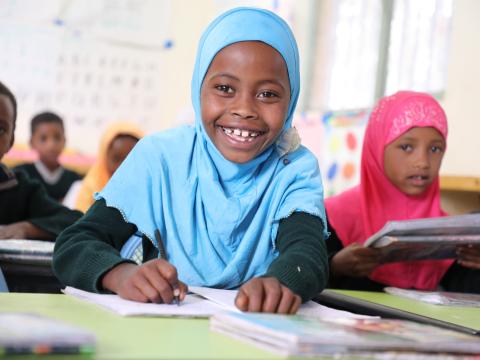Early Child Development Enhances Communication and Literacy Skills

The first five years of a child’s life are the most important for healthy development and long-term well-being. The experiences and relationships formed during this period of rapid brain development build a foundation for future learning and success. 2019 UNICEF’s first-ever global report on pre-primary education reveals that children enrolled in at least one year of pre-primary education are more likely to develop the critical skills they need to succeed in school, are less likely to repeat grades or drop out of school, and are, therefore, more able to contribute to peaceful and prosperous societies and economies when they reach adulthood.
The majority of children in rural areas do not have pre-primary education in Ethiopia. If available, the cost of school pay is very high and unaffordable for the majority of the community. Sagure Town children, some 200 km east of the capital, Addis Ababa, were a typical example of these. There was one pre-primary- private school. The school pay was so high that most of the parents were not sending their children to this school.
Amina Beshir, 30, is a mother of four and lives in Sagure Town. Just like the majority of the community members, she was not able to send her children to preschool due to high pay. She says, "I know how important it is to send children to the pre-primary center for rapid brain development and skills. However, due to the high cost of the existing preschool, I was not able to send two of my children to pre-primary school. They started their primary education in grade 1 when they turned seven."
In response to this, World Vision, in collaboration with the local government, opened an early childhood development (ECD) center in Sagure Town to help children attend school in their early years. The five-year-old Fate, Amina’s third daughter, is lucky enough to have the opportunity to go to a World Vision early childhood development (ECD) center when she turned four. Now she is attending World Vision's ECD. Amina says, "I am very thrilled to be able to send my little daughter to this ECD at such an early age. "She is able to differentiate between letters, read words, tell you parts of the human body from hair to toes in English, and has developed the confidence to communicate with children within seven months of the time of her joining."
 Amina is very amazed at the difference between her two children, who started their primary education at seven, and Fate who started at four. She says, "When I compare the difference between my two children, who started school in grade 1, and Fate, I see a big difference. Fate is more communicative, active, and a fast learner. She knows English words better than her siblings, who are in grades 2 and 3. It is amazing to see her help her older siblings with some of their assignments.
Amina is very amazed at the difference between her two children, who started their primary education at seven, and Fate who started at four. She says, "When I compare the difference between my two children, who started school in grade 1, and Fate, I see a big difference. Fate is more communicative, active, and a fast learner. She knows English words better than her siblings, who are in grades 2 and 3. It is amazing to see her help her older siblings with some of their assignments.
Fate is also very pleased to be in ECD. She says, "I like this school so much." I learn ABCD in English and Abachada in Afan Oromo. I also know numbers, songs, swing games, hide and seek, and others. I enjoy myself with my classmates. "It is good to be here all the time."
WVE has established about 889 ECD centers within primary school compounds in about 40 districts. Moreover, in collaboration with the community and local government, it established 318 satellite ECD centers within villages for those children living far from primary schools. This effort has created quality early learning programme access for about 62,233 (31,085 Girls) children. The government has started replicating ECD at schools. Amhara Regional State has established 57 satellite ECD centers in Jabi tena District. Oromia Regional State is also expanding satellite ECD centers across the inner villages to address the needs of children residing in the remotest areas.